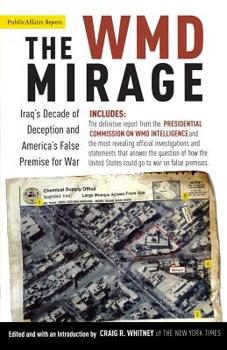The WMD Mirage: Iraq's Decade of Deception and America's False Premise for War (Publicaffairs Reports)
Select Format
Select Condition 
Book Overview
Features the official report from the bipartisan Commission on the Intelligence Capabilities of the United States Regarding Weapons of Mass Destruction -- named by President Bush to try to prevent similar policy debacles in Iran and North Korea. It also includes the official speeches, United Nations reports, and declassified government investigation reports that show, step by step, how the United States got the crucial question of arms in Iraq so terribly wrong. The documents show that: The CIA concluded in 2002 that Iraq had reconstituted its WMD programs, but in fact Saddam had dismantled them;
American policymakers consistently assumed the worst case: regardless of his denials, if there was intelligence that Saddam might be making weapons of mass destruction then he had them and was hiding them. UN inspectors, by contrast, assumed that thorough inspection and insistence on complete Iraqi documentation could determine what the truth was;
UN inspectors were frustrated by Saddam's refusal to cooperate freely and thwarted by American military impatience just as they thought themselves on the verge of success;
American inspectors sent in after the war in 2003 found no weapons of mass destruction and how they--and Washington insiders--began to question the basis of the prewar intelligence. The New York Times editor and contributor to The 9/11 Investigations (PublicAffairs, 2004) Craig R. Whitney has scoured the documents surrounding the search for Iraq's weapons of mass destruction. In The WMD Mirage, he has assembled the most revelatory and pertinent of these. The result is a startling narrative trail that leads readers through the intelligence and misinformation leading into Iraq -- and a telling portrait of how the Bush administration, whether deliberately or unintentionally, with scant evidence and largely against the will of the international community, convinced the American people and their few allies of the urgent need for war. A must-read for scholars, voters, and anyone interested in the goings-on in Iraq, the growing threats perceived elsewhere, and the truth behind our frayed international reputation, The WMD Mirage offers the real story of the missing weapons of mass destruction. In offering such a clear-eyed and documented picture of how we got it wrong in Iraq, The WMD Mirage is the first widely-available book that also includes the new conclusions of the Presidential Weapons of Mass Destruction Commission.
American policymakers consistently assumed the worst case: regardless of his denials, if there was intelligence that Saddam might be making weapons of mass destruction then he had them and was hiding them. UN inspectors, by contrast, assumed that thorough inspection and insistence on complete Iraqi documentation could determine what the truth was;
UN inspectors were frustrated by Saddam's refusal to cooperate freely and thwarted by American military impatience just as they thought themselves on the verge of success;
American inspectors sent in after the war in 2003 found no weapons of mass destruction and how they--and Washington insiders--began to question the basis of the prewar intelligence. The New York Times editor and contributor to The 9/11 Investigations (PublicAffairs, 2004) Craig R. Whitney has scoured the documents surrounding the search for Iraq's weapons of mass destruction. In The WMD Mirage, he has assembled the most revelatory and pertinent of these. The result is a startling narrative trail that leads readers through the intelligence and misinformation leading into Iraq -- and a telling portrait of how the Bush administration, whether deliberately or unintentionally, with scant evidence and largely against the will of the international community, convinced the American people and their few allies of the urgent need for war. A must-read for scholars, voters, and anyone interested in the goings-on in Iraq, the growing threats perceived elsewhere, and the truth behind our frayed international reputation, The WMD Mirage offers the real story of the missing weapons of mass destruction. In offering such a clear-eyed and documented picture of how we got it wrong in Iraq, The WMD Mirage is the first widely-available book that also includes the new conclusions of the Presidential Weapons of Mass Destruction Commission.
Format:Paperback
Language:English
ISBN:1586483617
ISBN13:9781586483616
Release Date:April 2005
Publisher:PublicAffairs
Length:671 Pages
Weight:0.22 lbs.
Dimensions:1.7" x 5.5" x 8.5"
Customer Reviews
1 rating
The Definitive Report
Published by Thriftbooks.com User , 19 years ago
Americans absolutely love conspiracy theories. It seems that it is much easy to believe in a conspiracy with 'they' being out to get you than to simply say that a bunch of people screwed up. And now it seems that we've finally found one to, hopefully, replace the conspiracy that killed Kennedy and perhaps even the one about the UFO's at Roswell. The truth appears to be bad enough. The intelligence agencies of the United States, Britain, Australia, Israel, Germany, France and Russia all got it wrong. (Yes, France and Russia believed in the WMD's as well but didn't want an invasion because they were getting preferential oil pricing from Iraq to trade for weapons.) The real problem here is that if we believe in a conspiracy, then we won't feel it necessary to take the steps to fix the real problem. This book has been dismissed as centrist propaganda by one reviewer. I don't know what that is, left wing I know, right wing I know. Centrist to me says that the writer is trying to be unbiased - and that's what I really want to read. It seems to me that the book is pretty fairly balanced. My only real complaint is that it doesn't have an index, and with its format, it is sometimes difficult to go back and see where it said something. For another report, the article in the Atlantic in the January/February 2004 by Kenneth M. Pollack titled Spies, Lies, and Weapons: What Went Wrong is highly recommended - It's available on line at no charge.





